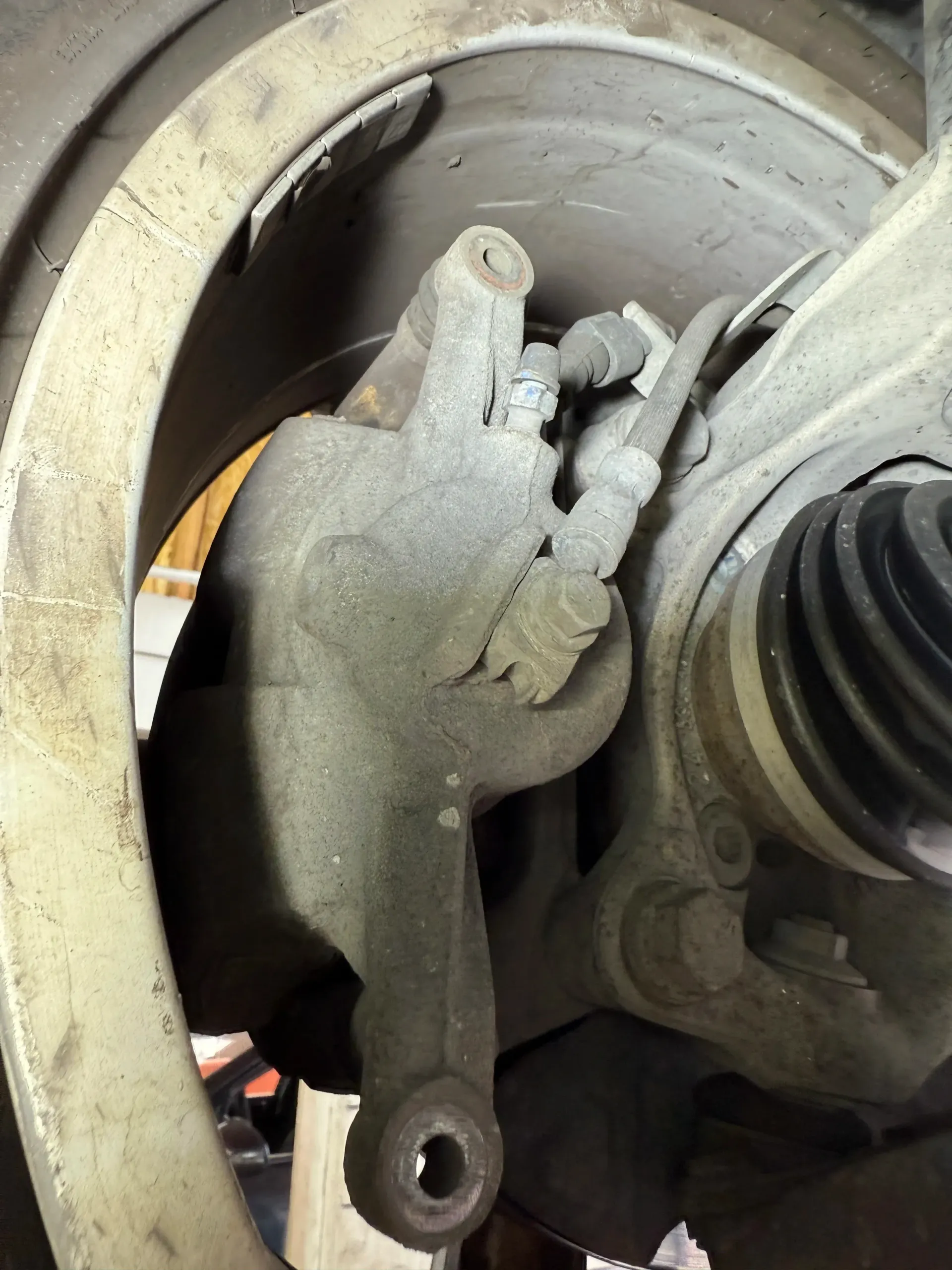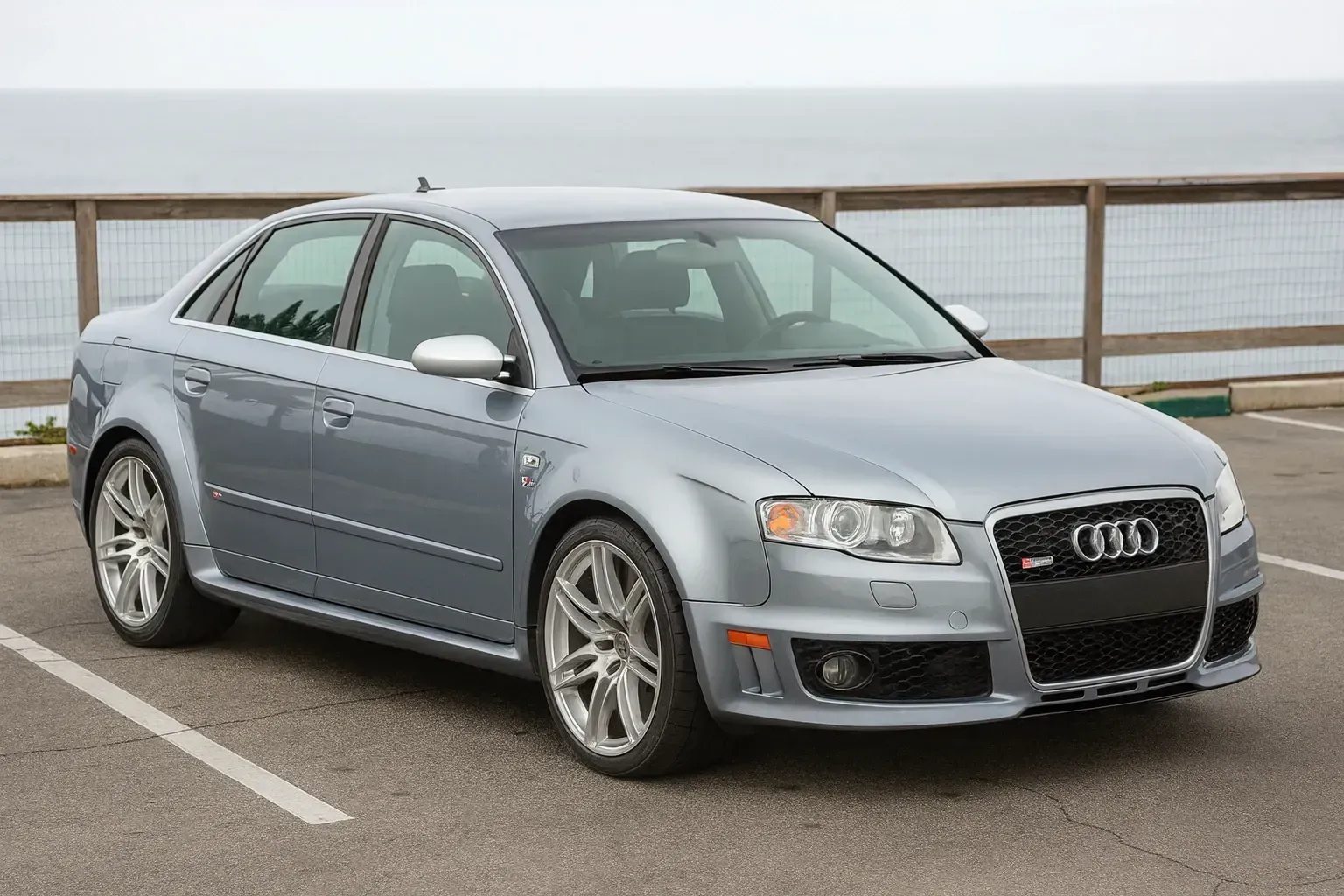Quick Summary
- Issue: Front right side air suspension dropping after sitting
- Vehicle: 2011 Porsche Cayenne Turbo with 118,977 miles
- Diagnosis: Internal pressure loss in air suspension distribution block
- Fix: Replaced air suspension solenoid valve block/distribution block
- Local Impact: Serviced in Los Angeles, ensuring safe, reliable driving conditions.
A 2011 Porsche Cayenne Turbo with air suspension dropping on one side typically indicates internal pressure loss in the distribution block. This critical component controls air flow to each suspension corner, and when internal seals fail, pressure slowly bleeds out causing the vehicle to sag. Air suspension systems on high-mileage Cayennes (over 100,000 miles) commonly experience distribution block failures due to seal deterioration from heat cycling and age. Euro Tech Motors resolved this exact issue by replacing the faulty air suspension solenoid valve block, restoring proper ride height and system pressure.
Related Questions About This Issue
- What causes air suspension to drop on one corner of a 2011 Porsche Cayenne?
- How do you diagnose internal leaks in Porsche air suspension systems?
- Is it safe to drive my 2011 Cayenne Turbo with sagging air suspension?
- How long do Porsche Cayenne air suspension distribution blocks typically last?
- What are the signs of a failing air suspension solenoid valve block?
Table of Contents
- Understanding the Air Suspension Distribution Block
- Why Does This Cause My 2011 Cayenne's Suspension to Drop?
- How Was This Diagnosed on the Cayenne Turbo?
- How We Repaired the Air Suspension System
- Customer Reviews
- Frequently Asked Questions
Understanding the Air Suspension Distribution Block
The air suspension distribution block in your 2011 Porsche Cayenne Turbo is the central hub that controls air pressure to each wheel. This complex component contains multiple solenoid valves and internal seals that direct compressed air from the compressor to individual air springs at each corner of the vehicle.
Here are the key functions of this critical component:
Pressure Distribution: Routes compressed air to specific suspension corners based on system demands and driving conditions.
Height Control: Maintains proper ride height by adding or releasing air pressure as needed.
System Isolation: Isolates individual corners when repairs are needed or when the system detects leaks.
When internal seals within the distribution block deteriorate, they create microscopic leak paths that slowly bleed pressure. This typically happens gradually, which is why the vehicle may sit fine initially but drop overnight or after extended parking.
Why Does This Cause My 2011 Cayenne's Suspension to Drop?
Your Cayenne's air suspension relies on sealed pressure to maintain ride height. Here are the 3 main ways distribution block failure causes suspension drop:
Internal Seal Degradation: After 10+ years and high mileage, rubber seals inside the block shrink and crack, creating tiny leak paths that aren't immediately obvious.
Slow Pressure Bleed: Unlike external leaks that are visible, internal leaks within the distribution block allow air to escape between chambers, causing gradual pressure loss over hours or days.
Solenoid Valve Issues: Individual solenoid valves within the block can stick or fail to seal properly, preventing the system from maintaining pressure to specific corners.
This type of failure is particularly common in Los Angeles due to temperature extremes and the age of many Cayenne Turbos on the road. The constant expansion and contraction of seals accelerates wear over time.
How Was This Diagnosed on the Cayenne Turbo?
Diagnosing internal distribution block leaks requires systematic pressure monitoring. Here are the 4 diagnostic steps Euro Tech Motors technicians used:
Extended Monitoring: The vehicle was monitored for 3 days to observe pressure loss patterns, as internal leaks often take time to manifest.
Pressure Testing: Specialized equipment measured pressure at the distribution block to identify microscopic internal leakage that wouldn't be visible externally.
System Isolation: Individual corners were isolated to determine if the leak was in the distribution block or elsewhere in the system.
Visual Inspection: The entire system was inspected for external leaks, including the discovery of oily residue at the right rear shock tube (separate issue).
In this specific case, the pressure monitoring revealed very small but consistent internal pressure loss within the distribution block. This type of precise diagnosis is what Porsche repair specialists rely on to identify complex air suspension issues that other shops might miss.
How We Repaired the Air Suspension System
Here are the specific repairs we performed:
Repair: Replace air suspension solenoid valve block
Overview: Installed new distribution block with fresh internal seals and solenoid valves
Replacing the distribution block on a 2011 Porsche Cayenne Turbo requires specialized knowledge of the air suspension system. The process involves:
System Depressurization: The entire air suspension system must be safely depressurized before component removal.
Access and Removal: The distribution block is located in a confined space that requires removal of surrounding components for proper access.
Precise Installation: The new block must be installed with proper torque specifications and all air lines correctly connected to prevent future leaks.
System Calibration: After installation, the air suspension system requires recalibration to ensure proper operation and ride height settings.
Customer Reviews
⭐⭐⭐⭐⭐ "My Cayenne was dropping overnight on the right front. Euro Tech Motors diagnosed the internal leak that other shops missed. Three days of testing paid off - no more sagging suspension."
⭐⭐⭐⭐⭐ "The air suspension issue was driving me crazy. They took the time to properly diagnose the distribution block problem and fixed it right the first time."
⭐⭐⭐⭐⭐ "Professional service and thorough diagnosis. The Cayenne rides like new again and hasn't dropped since the repair. Worth every penny."
Frequently Asked Questions
Q: How long can I drive my 2011 Cayenne Turbo with a dropping air suspension?
A: Driving with a dropping air suspension can damage other components and create unsafe handling characteristics. The uneven ride height puts stress on CV joints, tires, and other suspension components. Get it diagnosed and repaired promptly.
Q: Will a failing distribution block damage other air suspension components?
A: Yes, when the distribution block fails, the air compressor often works overtime trying to maintain pressure, which can lead to premature compressor failure. Additionally, uneven ride height puts extra stress on air springs and shock absorbers.
Q: How can I tell if it's the distribution block or an air spring leak?
A: Distribution block leaks typically cause gradual pressure loss over hours or days, while air spring leaks often cause immediate or rapid dropping. Professional pressure testing is the only way to definitively diagnose internal distribution block issues.
Q: How often do Cayenne air suspension distribution blocks fail?
A: Distribution blocks commonly fail between 100,000-150,000 miles due to internal seal degradation. High-mileage vehicles in climates with temperature extremes tend to experience failures on the earlier side of this range.
Q: Can I prevent distribution block failure in my Porsche Cayenne?
A: While seal degradation is inevitable with age, regular air suspension service and avoiding extended periods of non-use can help extend component life. Having the system inspected during regular maintenance can catch issues early.
If your 2011 Porsche Cayenne Turbo is experiencing air suspension dropping on one side, don't wait for the problem to worsen or damage other expensive components. Internal distribution block leaks require specialized diagnostic equipment and expertise to identify and repair properly. Professional diagnosis will pinpoint the exact cause and prevent costly secondary damage to your air compressor and other suspension components. Los Angeles drivers shouldn't compromise on safety and ride quality when it comes to air suspension issues - schedule your diagnostic appointment today.









